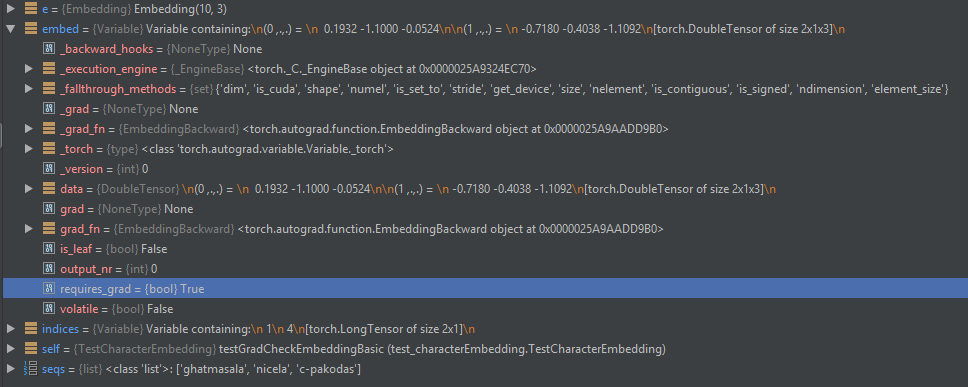I’m grad-checking a model, and seem to have traced a broken gradient to the embeddings I was plugging in.
Here is a minimal example of my code… any thoughts welcome.
import torch.nn as nn
from torch.nn.utils.rnn import pack_padded_sequence, pad_packed_sequence
from torch.autograd.gradcheck import gradcheck
from torch.autograd import Variable
import torch
def testGradCheckEmbeddingBasic(self):
seqs = ['ghatmasala', 'nicela', 'c-pakodas']
e = nn.Embedding(10, 3, sparse=False).double()
indices = Variable(torch.LongTensor([[1], [4]]))
embed = e(indices)
print(embed)
input = (embed, )
model = nn.Linear(3, 3).double()
test = gradcheck(model, input, eps=1e-6, atol=1e-4)
Error I get is…
Variable containing:
(0 ,.,.) =
-1.7624 0.1646 -0.5719
(1 ,.,.) =
-0.5188 -0.2282 1.3176
[torch.DoubleTensor of size 2x1x3]
Ran 1 test in 0.232s
FAILED (errors=1)
Error
Traceback (most recent call last):
File “C:\Users\ZEBEAST\Anaconda3\envs\pytorch\lib\unittest\case.py”, line 59, in testPartExecutor
yield
File “C:\Users\ZEBEAST\Anaconda3\envs\pytorch\lib\unittest\case.py”, line 605, in run
testMethod()
File “C:\Users\ZEBEAST\PycharmProjects\sauron\tests\test_characterEmbedding.py”, line 51, in testGradCheckEmbeddingBasic
test = gradcheck(model, input, eps=1e-6, atol=1e-4)
File “C:\Users\ZEBEAST\Anaconda3\envs\pytorch\lib\site-packages\torch\autograd\gradcheck.py”, line 181, in gradcheck
return fail_test(‘for output no. %d,\n numerical:%s\nanalytical:%s\n’ % (j, numerical, analytical))
File “C:\Users\ZEBEAST\Anaconda3\envs\pytorch\lib\site-packages\torch\autograd\gradcheck.py”, line 166, in fail_test
raise RuntimeError(msg)
RuntimeError: for output no. 0,
numerical:(
0.3081 -0.1945 -0.0135 0.0000 0.0000 0.0000
-0.0716 0.3882 0.2380 0.0000 0.0000 0.0000
0.3901 -0.1542 0.5559 0.0000 0.0000 0.0000
0.0000 0.0000 0.0000 0.3081 -0.1945 -0.0135
0.0000 0.0000 0.0000 -0.0716 0.3882 0.2380
0.0000 0.0000 0.0000 0.3901 -0.1542 0.5559
[torch.FloatTensor of size 6x6]
,)
analytical:(
0 0 0 0 0 0
0 0 0 0 0 0
0 0 0 0 0 0
0 0 0 0 0 0
0 0 0 0 0 0
0 0 0 0 0 0
[torch.FloatTensor of size 6x6]
,)
